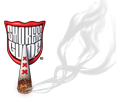Pro-Drug War
More Drug War? Despite general consensus agreeing that drugs should be decriminalised or legalised the UK Government has decided to expand the drug war. New crimes equal new criminals, and also new methods for criminal organisations to generate income. If the drug war funds terrorism, why did the UK Government just expand the stock selection of drug dealers?
Anti-Business
As if minimum wage cashier workers didn’t have enough to deal with now they are also now tasked with being unpaid workers for the states war on drugs. The UK Psychoactive Substances Act mainly deals with supply of psychoactive substances, and by the letter of the law (Article 5.1c) “A person commits an offence if...” “the person knows or suspects, or ought to know or suspect, that the substance is a psychoactive substance”.
Anti-Young People
The UK government has published guidance for retailers for the new law, with examples of how they must enforce the law. The guidance notes provide some examples for retailers:
Case study: whipped cream canisters containing nitrous oxide
A customer who looks over 25 attempts to buy several containers of whipped cream canisters containing nitrous oxide from a shop at 11pm. They are not buying anything else. The cashier asks the customer why they’re buying whipped cream. The customer hesitates in replying and when they do they seem intoxicated, slurring their words. In this scenario the cashier should consider not selling the goods.Case study: anti-freeze
In a motoring supplies store a male who looks in his 50s buys some anti-freeze. He also buys other items related to car maintenance. It’s during the day in the middle of the week and he seems sober. In this scenario and without any further risk factors, the cashier would be justified in assessing this purchase as being unlikely to be for consumption for psychoactive effect.
Anyone reading these “guidance notes” should immediately realise how unworkable this law is; it seems to be targeting young people mostly, assuming they will be using the substances to get high. Obviously anyone with any sense would make sure if they were breaking the law they would cover there tracks. If you buy some cream along with the nitrous oxide would that make it look legal? By the governments examples; probably yes.
Don’t Do Drugs - Except the Taxed Ones
This new law is clearly pro-alcohol & tobacco - which just so happen to be the most used and most dangerous psychoactive substances. We could never suggest any substance should be illegal, but if it was really about harm, surely alcohol and tobacco would be the first in the list!
Psychoactive Substances are Illegal - But what are they?
Well not alcohol or tobacco products obviously, too much tax revenue and interest groups for those to be banned. But where do you really draw the line? If substances that can cause “hallucinations, changes in alertness, perception of time and space, mood or empathy with others, drowsiness” are deemed to illegal what about products or activities that do the same.
Will the “runners high” be deemed illegal? Will unpopular art cause the wrong reaction? What about a passionate kiss, a piece of music or a sunset? Will people who provide access to these be prosecuted? Of course this law is targeted at supply not use, but that is more just the tactic of the government drug war to try and “cut off” the supply – generally each time another dealer just takes the job. Supply and demand works in all markets.
The question of free choice also needs to be mentioned, should a person not be in control of their own mind, as long as no harm is done to others. There are many people who would not be traditionally seen as drug users but who use substances to help with alertness or relaxation, many supplements and vitamins are manufactured for this purpose. Then there are nootropics, drugs designed to boost cognitive function, which could also be illegal to sell.
There is also the case of substances that may become psychoactive, or may be unknowingly psychoactive. Not everyone knows that nutmeg can be a drug! And what about things like terpenes, or food that is fermenting? Will blue cheese, mouldy apples or dark chocolate be illegal?
Such a vague law may be designed to prepare for new substances to be illegal due to their effects, but it results in a situation where no one is sure what is actually legal. How many hours must be spend enforcing this ridiculous new law? And for what benefit? To stop a few college kids from being able to inhale a few balloons of nitrous oxide, or force them to buy questionable substances from a drug dealer rather than safer tested options from a reputable shop - great work police. Surely there are real criminals; murderers, robbers or rapists that police time could be better spent on.
“Prohibition cannot be enforced for the simple reason that the majority of the American people do not want it enforced and are resisting its enforcement. That being so, the orderly thing to do under our form of government is to abolish a law that cannot be enforced, a law which the people of the country do not want enforced.” New York Mayor (1934-1945) Fiorello La Guardia on alcohol prohibition.


![dfr fea francis le 2730636a[1]](/share/image.php/dfr_fea_francis_le_2730636a_1.jpg?height=531&cropratio=16:9&image=/pics/pic/19-4138-999-c5c.jpg)
 Top 5 Reasons Why The UK Psychoactive Substances Act Won't...
Top 5 Reasons Why The UK Psychoactive Substances Act Won't...  Magic Truffles Safe Trip Tips & Advice From The Jellinek...
Magic Truffles Safe Trip Tips & Advice From The Jellinek...  Smart Drugs A-Z - What's On An Amsterdam Smart Shop Menu?
Smart Drugs A-Z - What's On An Amsterdam Smart Shop Menu?  Prohibition Does Not Work.
Prohibition Does Not Work. 
